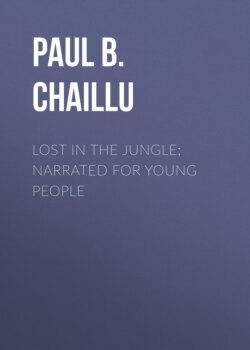Читать книгу Lost in the Jungle; Narrated for Young People - Paul B. Du Chaillu - Страница 13
На сайте Литреса книга снята с продажи.
CHAPTER VII.
ОглавлениеTable of Contents
RETURN TO THE OVENGA RIVER.—THE MONKEYS AND THEIR FRIENDS THE BIRDS.—THEY LIVE TOGETHER.—WATCH BY MOONLIGHT FOR GAME.—KILL AN OSHENGUI.
After wandering through the forest for many days, we reached once more the banks of the River Rembo Ovenga, the waters of which had fallen twelve or fifteen feet, for we are in the dry season. The numerous aquatic birds and waders which come with the dry weather give the river a lively, pleasant appearance. The white sand which lines many parts of the shore is beautiful. The mornings are cool, and sometimes foggy. The dark green of the well-wooded banks had something grand about it. I, poor and lonely traveler, had a charming scene before me. The stream is still yellow, but far less so than in the rainy season. Then the rains were driving down a turbulent tide laden with mud washed down from the mountains and valleys; now the waters roll on placidly, as though all was peace and civilization on their borders.
New birds had come. The otters were plentiful, and fed on the fish that were thick in the stream.
In that great jungle beasts had been scarce for some time, and we had a hard time to get food.
But what a glorious time we had by ourselves in that forest! Oh how I enjoyed rambling in that jungle, though toiling hard, and often hungry and sick! How glad I always was when I returned to the banks of the Rembo Ovenga! I loved that river, for I knew that its waters, as they glided down, would disappear in that very ocean whose waves bathed the shores of both the Old and the New World. At times, when seated on its banks, I could not help it, I would think of friends absent, but dear to me. I remembered those I loved—I remembered the boys and girls who were slowly but surely growing men and women, but who were still young folks in my memory, though years were flying fast. The lad of the jungle had become a man also; his mustache had made its appearance, and had grown a good deal; his face had become older—probably he found it so when perchance he gazed in the looking-glass he carried with him. Disease, anxiety, sleepless nights, and traveling under the burning sun had begun to do their work; but, in despite of all, my heart was still young, and I loved more than ever those friends I had left behind.
I had come back to Obindji to see if I could get some plantains or smoked cassada, and then intended to return to the woods in search of new animals and new insects. King Obindji welcomed me, and was delighted to see Malaouen, Querlaouen, and Gambo once more, and his wives got food ready for us. Then we started again for the forest. I took with me lots of small shot of different sizes for birds, and once more we would get lost in the jungle, but from time to time we would come back to the uninhabited banks of the wild Ovenga to look at our river.
One day, wandering in the forest, I spied a queer-looking bird I had not seen before, and I immediately got ready to chase it. This bird was called by the natives the monkey-bird (Buceros albocrystatus).
